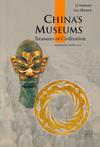中国博物馆
出版时间:2009-1 出版社:五洲传播出版社 作者:黎先耀,罗哲文 著,(美)艾梅霞 译 页数:211
内容概要
China has an ancient civilization with a very long history. Understanding its olely through the study of documents is clearly inadequate. A wealth of objects and remains has been preserved on China's vast territory and underground; much of which has been collected and is exhibited in various kinds of museums. This raw material of history can, in a certain sense, be considered more valuable for our understanding of the past of China than documents and historical records. Among the sixty-one museums selected for this book, many have been designated as key protected cultural sites by China. Some have been included in the UNESCO List of World Cultural Heritage Sites. We hope that this volume can serve visitors as a guide to understanding these museums.
作者简介
作者:黎先耀 罗哲文 译者:(美国)艾梅霞
书籍目录
Foreword: Reading the History of Chinese Civilization from Its MuseumsNational Treasures Palace Museum Taipei Palace Museum Capital Museum Shanghai Museum Shaanxi History Museum Henan Museum Nanjing Museum Museum of Liaoning Province Three Gorges MuseumContributions of China's National Minorities Cultural Palace of Nationalities Shenyang Palace Museum Inner Mongolia Museum Xinjiang Uighur Autonomous Region Museum Tibet Museum Museum of Guangxi Zhuang Autonomous Region Ningxia Museum Yunnan Provincial MuseumTracing the Tracks of History National Museum of China Sanxingdui Museum Jinsha Site Museum Zhouyuan Museum Suizhou Zenghouyi Tomb Site Exhibition Hall Museum of the Terracotta Warriors and Horses of Qin Shihuang Changsha Mawangdui Han Tomb Cultural Relics Exhibition Hall Mancheng Han Tomb Site Exhibition HallTreasures of China's Stone Grottoes Dunhuang Mogao Grottoes Yungang Grottoes Lonzmen Grottoes Dazu Rock CarvingsUnderground Imperial Palaces Tomb of the Yellow Emperor Maoling Museum Qianling Museum Dingling Museum Qing Dongling and Qing Xiling TombsHua-xia Civilization China National Silk Museum China National Tea Museum lingdezhen Ceramics Museum Huqingyutang Museum of Traditional Chinese Medicine Quanzhou Maritime MuseumAssembly of Talents: Arts and Literature National Art Museum of China National Museum of Modern Chinese Literature Beijing Theater Museum China Sports Museum Hong Kong Museum of History Macao Maritime MuseumGardens and Architectural Monuments Suzhou Garden Museum Summer Palace Great Wall Museum of China Temple of Heaven Temple and Cemetery of Confucius and the Kong Family Mansion in Qufu Jinci MuseumHomes of Our Forebears: Archaeology Zhoukoudian Peking Man Site Museum Xinle Site Museum Hemudu Site Museum Xi'an Banpo MuseumMarvels of Heaven and Earth: Natural History Beijing Ancient Observatory Geological Museum of China Zigong Dinosaur Museum Tonglushan Ancient Metallurgy Museum Zigong Salt History MuseumAppendix: Chronological Table of the Chinese Dynasties
章节摘录
版权页: 插图: (around 1.7 million years ago to 10,000 years ago),the EarlyNeolithic period (around 10,000 years ago to 5,000 years ago) andthe Late Neolithic period (around 5000 to 4000 years ago).In thePaleolithic section you can see China's earliest "sapiens" calledYuanmou Man,the slightly later Lantian Man,Beijing Man,Jinniushan Man,and also Shandingdong Man.The last had alreadyentered the homo sapiens period.These ancestors wrote the firstpage in the chapter of China's history.Stone tools that they created,the seeds they collected,bones of the animals that they hunted areall documented in the exhibition cases.The bone-made needle andthe teeth and shells that the Shandingdong Man used for jewelryindicate that,by his time,mankind had already begun to sew clothing and have an awareness of aesthetics. From around 10,000 years ago,mankind began to polish stonetools,make ceramics,weave cloth,and engage in other handicraftsproduction.The distribution of clans also began to be morewidespread.In the exhibit,rice kernels from some 8,000 years ago,bone implements of some 7,000 years ago,and the model of a matriarchal village unearthed in Shaanxi Province from some 6,000years ago can be seen.From around 5,000 years ago,agriculturaltechniques were well advanced and besides being able to providefor his own basic needs,man was able to produce a certain surplus.This led to a system of private ownership and the development ofclasses.At this time,special handicraft industries appeared,alsothe rudiments of writing,cultural arts and religion.In the exhibits,one can see important ritual implements of the period made fromstone and jade. The slave society was mankind's first class society in history.The exhibition displaying this period is divided into five sections:Xia dynasty,Shang dynasty,Western Zhou,and Spring and Autumn periods,and one that covers all tribes or "nationalities" fromXia to Spring and Autumn. The Xia (2070-1600 BC) was the first dynasty in Chinese history.
编辑推荐
《中国博物馆(英文版)》介绍的这些精彩的博物馆,很多是国家重点文物保护单位,有些并已被联合国教科文组织列入世界文化遗产名录。我们希望《中国博物馆(英文版)》能成为国内外公众按图索骥的人文导游指南。
图书封面
评论、评分、阅读与下载
用户评论 (总计1条)
- 在微博上看到分享的外國人寫的CHINA:MUSEUMS這本書,就來這訂了這本,也沒仔細看清標題,以為是同一本書,結果拿回來一看,是中國人寫的英文版的CHINA'S MUSEUM。幸好也是一本不錯的書,還算沒有浪費,就是有些貴,內容也不夠豐富,只是對一些大博物館的資料簡單介紹而已。建議買來送給外國朋友就好了,自己買來看就算了。
